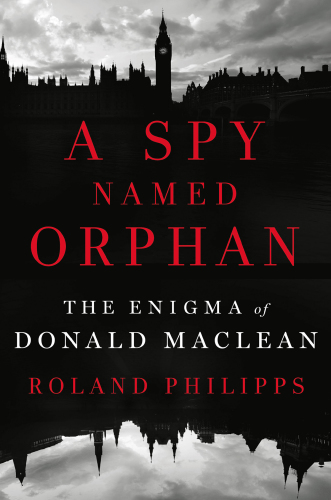
A Spy Named Orphan
The Soviet Agent Who Stole the West's Greatest Secrets
- اطلاعات
- نقد و بررسی
- دیدگاه کاربران
نقد و بررسی

February 26, 2018
In this often exciting narrative, Philipps uses a trove of recently declassified files to trace the arc of Russian spy Donald Maclean’s life. While studying at Cambridge, Maclean became a supporter of communism and fatefully met Kim Philby, a fellow member of the Cambridge Five spy ring. Philby went on to become a high-ranking British intelligence officer, and he recruited Maclean as a Soviet agent before Maclean landed a job with the Foreign Office in 1935. The valuable information Maclean was to share included the truth about America’s nuclear capacity in 1948, as tensions flared over the division of Berlin, and secrets relating to America’s development of uranium for use in nuclear weapons. Maclean and his co-conspirators were eventually discovered, leading to his flight to Russia in 1951, where he lived until his death in 1983. Maclean’s motivations for betraying his country remain murky, despite Philipps’s speculation that its seeds lay in the oppressive private school he attended—Gresham’s School, in an isolated pocket of eastern England. Philipps believes that the required loyalty oaths to the school’s masters encouraged betrayals of one’s classmates and contributed to making Gresham’s “the perfect psychological training-ground for a nascent spy.” Even though Maclean remains a mysterious figure, this is likely to be considered the definitive biography.

March 15, 2018
A tale of the tangled web spun by a Briton who spied for the Soviet Union and ended his days in Moscow exile.Less cynical, and perhaps less effective, than his contemporaries Kim Philby and Guy Burgess, fellow members of the spy ring that came to be called the Cambridge Five, Donald Maclean (1913-1983) was a true believer in the communist cause. After defecting to the Soviet Union, he wrote to his mother that he had "done nothing of which I am ashamed and of which you need be ashamed for me." The British government felt differently, of course. Philipps, whose grandfather worked alongside Maclean in the Foreign Office, turns in a careful though fairly bland study of Maclean and his motivations, which, though apparently pure, were given a desperate edge by a long dependence on alcohol. As the author writes, if the Cambridge University of the 1920s was a broadly conservative place, by the 1930s, in the words of the poet Julian Bell, "a very large majority of the more intelligent undergraduates are Communists, or almost Communists." That was certainly true of Maclean, who otherwise had few of the psychological markers that Soviet spy recruiters sought--e.g., low self-esteem and distance among family members. Maclean was a solid performer as a spy, heeding instructions not to socialize with his fellow spooks inasmuch as it was "against Soviet tradecraft to allow social contacts between agents," even as Philby and Burgess broke that rule by living together. Maclean performed his government job well, too, leading to a posting in Washington, D.C., where he enjoyed "unparalleled access...[in] the hub of the Western allies in the rapidly burgeoning Cold War." Even so, writes Philipps, the Soviets were careful to shield him from the likes of Alger Hiss, the Venona project, and other spy operations.A solid if sometimes plodding account, of much interest to students of espionage and counterintelligence.
COPYRIGHT(2018) Kirkus Reviews, ALL RIGHTS RESERVED.

May 1, 2018
The secrets passed on to Soviet dictator Joseph Stalin from 1942 to 1951 by British diplomat Donald Maclean, one of the Cambridge Five, helped the USSR stay one step ahead of the British and American allies during the closing days of World War II and the early critical years of the Cold War. Philipps, former publisher at Hodder & Stoughton, used newly opened files from the British Foreign Office and MI5 to write this book. It closely parallels Andrew Lownie's Stalin's Englishman and chronicles much of the same materials. Maclean, code named "Orphan," was so entrenched in the British Foreign Office that he had access to all secrets. Maclean's conflicted conscience led him to increasing alcoholism and abuse of his wife, Melinda. With the Venona project (decrypting coded messages) closing in on him, Maclean fell apart and had a breakdown while serving in his last post in Cairo, Egypt; he was transferred back to London to recuperate. Kim Philby warned Burgess and Maclean about their impending exposure, allowing them to make a successful escape to the USSR where they lived out their lives. VERDICT Philipps brilliantly succeeds in painting a complete picture of the most devastating spy in recent history. Russophiles and amateur historians will be delighted. [See Prepub Alert, 11/22/17.]--Harry Willems, Great Bend, KS
Copyright 2018 Library Journal, LLC Used with permission.




دیدگاه کاربران